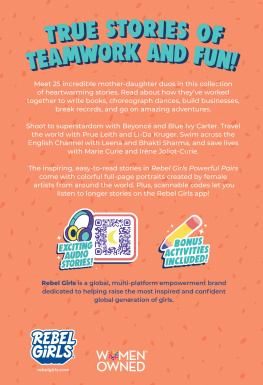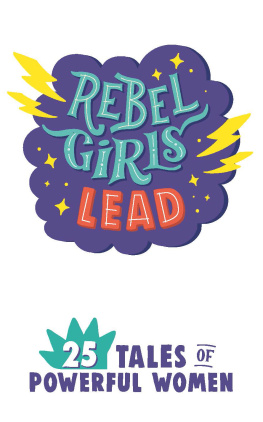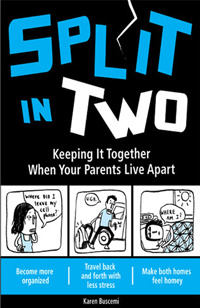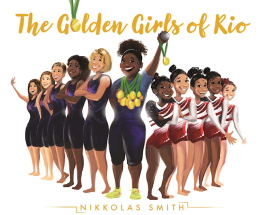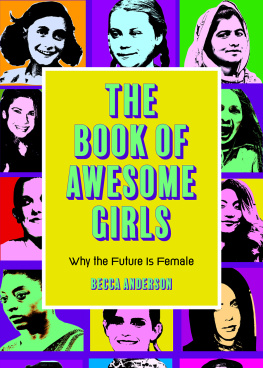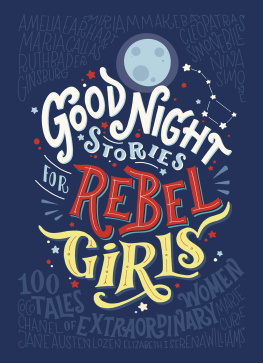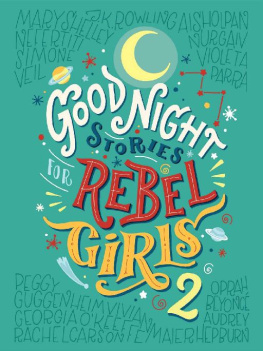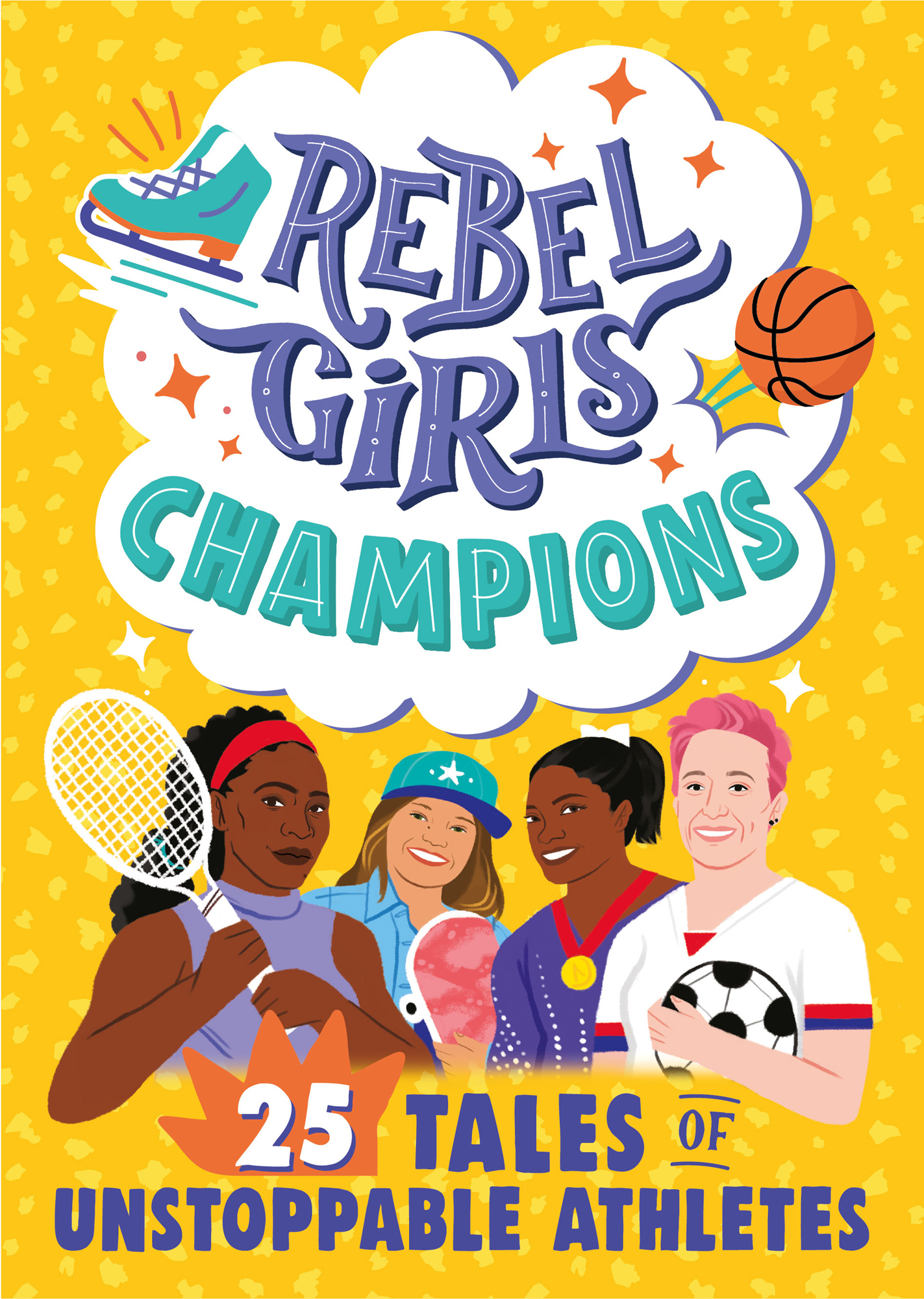FOREWORD

Dear Rebels,
As a child, my parents were eager to find a sport for me to playone with a modest uniform to accompany my hijab. Thats how we found fencing. I loved everything about it, from the speed and strength to the carefully planned strategy of the sport. But sometimes, it was lonely. None of the other fencers looked like me. There were few other Black or brown athletes on the fencing team and definitely no other Muslim girls in hijab. But I didnt let that stop me.
What I loved most about fencing was the thrill of getting better. After I graduated from Duke University, I chased the dream of one day becoming the first woman of color to compete for the US National Team in sabre. I started from the bottom, with no experience on the senior level and certainly no experience on the World Cup circuit. I challenged myself to get better and to change the sport I loved. I went from being a young 20-something qualifying for my first US World Championship Team in Paris, France, to becoming one of the best fencers in the world.
As a five-time world medalist and world champion, the true peak of my career came in 2016, when I qualified for my first Olympic team. I had a unique opportunity to change the narrative about the Muslim community and challenge the way people viewed us. That summer at the Rio Olympic Games, I became the first woman in hijab to represent the United States and the first Muslim American woman to win an Olympic medal. I have proved the impossible is possible. Now I hope that young kids who look like mekids with brown skin and who maybe wear hijabknow that there is space for them in any sport they love.
And thats why I love books like thisbooks that celebrate women in sports. Rebel Girls Champions showcases women from all over the world playing many different sportsand each story gives readers examples of focus, determination, and sportsmanship. Readers can enjoy stories about their favorite athletes, like Sky Brown, Chloe Kim, and Serena Williams. And they can meet new role models, like Ishita Malaviya, the first female surfer in India, and Lina and Sanna El Kott Helander, who are happiest when testing their endurance, running high up in the mountains. Readers can also revel in the stories of Hidilyn Diaz and Ariarne Titmus, just a couple of the women who made headlines during the Tokyo Olympics in 2021.
I know from experience the amount of hard work and commitment it takes to reach the top of your sport as an athlete. And I know what its like to use your platform for good and to fight for social justice and other causes you believe in. Seeing athletes compete, break records, and achieve new heights is incredible. And seeing them take a standfor their mental health and equal treatmentis even better. Simone Biles, Megan Rapinoe, Allyson Felix, and other athletes are paving the way for a new generation of young women. Athletes like the ones in this book inspire usand teach us lessons for success in sports and in life.
Whether you play sports just for fun or you are training hard for a competition, know that you are always welcome in any sport you want to play. Know that, with practice, you will get better. You will get stronger. You will become faster. Know that your potential is limitless. Carry that knowledge with you on and off the field. It will change your life and help you as you serve others and speak up for the things you believe in.
Together, we can make the world a more inclusive and equitable place.
Ibtihaj Muhammad
ALICE MILLIAT

ROWER

O nce upon a time, women werent allowed to compete in the Olympic Games. The president of the International Olympic Committee (IOC) declared that sports were too violent and inappropriate for ladies. Thats ridiculous, thought Alice. She knew that women were strong and fastand competitive too.
Born in France in 1884, Alice studied to become a teacher and translator. But what really made her feel alive was playing sports. Swimming, hockey, and rowing helped her body grow stronger and her mind grow sharper. And she knew she wasnt the only one. Sports were good for everybody!
In 1919, Alice asked the IOC to include women in the track and field program. They said no. So she started her own organization, the Fdration Sportive Fminine Internationale (FSFI). Three years later, they organized a big one-day sporting event just for women.
Around 20,000 fans came to watch 11 events in a stadium near Paris. Athletes from Czechoslovakia, France, Switzerland, the United Kingdom, and the United States ran, jumped, and threw shot puts and javelins. By the end of the day, 18 world records were broken! Four years later, Alice organized the games again, calling it the Womens World Games. They had a special opening ceremony with 3,000 carrier pigeons released into the sky! The IOC wanted Alice to stop the games immediately. This time, it was her turn to say no. She would not back down until women were allowed in the Olympics.
It took more than 70 years for Alices dream to come true. By that time, Alice, the FSFI, and the Womens World Games were long gone. But today, every woman who steps into an Olympic arena has Alice to thank.
MAY 5, 1884MAY 19, 1957
FRANCE
I CAME UP AGAINST A SOLID WALL OF REFUSAL, WHICH LED DIRECTLY TO THE CREATION OF THE WOMENS OLYMPIC GAMES.
ALICE MILLIAT

ILLUSTRATION BY JULIETTE LVEILL
ALLYSON FELIX

SPRINTER

O nce upon a time, there was a girl who ran so fast she could outrace the wind. Her name was Allyson.
She took up running in her freshman year of high school, where some teammates called her Chicken Legs. Her limbs may have been long and thin, but they sure were powerful!
Soon, she was sprinting all over the world! Between the Athens, Beijing, London, and Rio Olympic Games, she won nine medals.
In 2018, Allyson decided to become a mother. She was so excited. But about eight months into her pregnancy, she realized that something wasnt right. Allyson had to have emergency surgery to deliver her daughter early.
This surgery saved both of their lives.
Allyson couldnt do much while she recovered. She could barely walk for 30 minutes at a time. She started thinking a lot about Black mothers. They died in childbirth at a much higher rate than other women. Allyson decided to speak out. She told her story to members of the US Congress and asked them to act. Allyson knew that words and actions mattered. When a sponsor wanted to pay her less after she became a mom, she acted. She found a new sponsor. Then, she started her own sneaker company!


